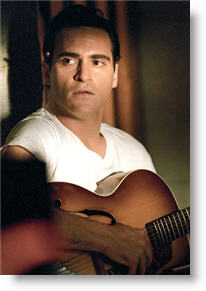God, Drugs and Country Western—Personal interview with “Walk the Line” (2005) lead actress Reese Witherspoon, actors Joaquin Phoenix, Waylon Payne, Tyler Hilton, and director James Mangold
by Chris Monroe
Staff Writer

Twentieth Century Fox biography picture “Walk the Line” starring Joaquin Phoenix and Reese Witherspoon, and directed by James Mangold, presents dramatic excerpts from the life of music legend Johnny Cash. One predictable selection is the launching of the Man in Black’s singing/songwriting career, with a second focus being his bout with drugs.
Reese Witherspoon
 During our interview, Reese Witherspoon did not talk directly about Christianity, but did make relevant comments about “spirituality” and church.
During our interview, Reese Witherspoon did not talk directly about Christianity, but did make relevant comments about “spirituality” and church.

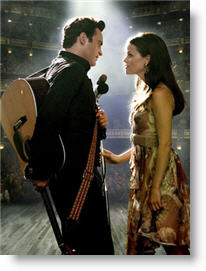
She said, “I think spirituality had a lot to do with him [Johnny Cash] getting off drugs. I don’t think it’s in the movie as much, but I know it had a lot to do with it.”
Witherspoon mentioned spirituality again when she discussed how she related with the character, June Carter Cash, by “just being a Southern person.”
It really is a different culture. It’s a different way of being raised, of appreciating the family, and spirituality, and your community.
June Carter’s parents had a direct influence on Johnny’s rehabilitation. Some of their interaction with John and June is depicted in the movie, and here is what Witherspoon had to say about them:
I don’t think they had the kind of look-the-other-way attitude. I don’t think that was part of their religion or their upbringing community. Again, that goes back to being Southern. You just don’t let your fellow man be left behind. So I think it was just a sort of natural extension of where they’re from.
The Carter family is well known to be good, upstanding Christians, and at least one scene in the movie refers directly to this. After being asked if faith was a part of her life, Reese said:
Mm hm. It is. Definitely. I was raised going to church every Sunday, and I go to church most Sundays with my kids. I think.it is a way you live your life. I think the Bible is a very important piece of literature. How I learned about that piece of literature was going to church on a Sunday. And I am a person very interested in learning and reading and being analytical about material, and from my career and what I do, then it is incredibly helpful to have that knowledge.
But also for me, where I am at in my career… so many people want to put you in a place that you are not real, and treat you like you are not real. For me, it’s a great experience, a grounding in that I’m standing next to people that have nothing and people who have everything, and we all treat each other the same, because we all are the same. But it’s just like a little weekly reminder. So that’s helpful to me, actually.
Joaquin Phoenix
 Actor Joaquin Phoenix also mentioned Cash’s spiritual life, but highlighted the love between John and June as the focal point to John’s redemption. When I asked him what he thinks ultimately saved Johnny Cash’s life, he said:
Actor Joaquin Phoenix also mentioned Cash’s spiritual life, but highlighted the love between John and June as the focal point to John’s redemption. When I asked him what he thinks ultimately saved Johnny Cash’s life, he said:
I don’t know that it’s one thing. I don’t think in ’68 that everything turned around for him, and everything was better and his life changed forever. It was an ongoing process. He continued to fight his addictions, which he was very open about throughout his life. But there was a turning point for him, and all these different forces came together.
June was obviously a big part of that, really helping him achieve sobriety and to maintain it. I think in some ways he fell back in love with music and with the stories he wanted to tell, and I think he was able to reconnect to an audience. At some point, it must have been very hard to maintain that connection, and I think that it was so vital to John’s experience as an artist… maintaining a connection with his audience.
Kind of the power of John’s music is a real sense of intimacy; you always feel like you’re right there in the room with him. Even at the height of his fame, he would still play shows on the back of a pick-up truck… But I think because of the touring schedule and because of his drug abuse, I think that inevitably he grew disconnected from what initially inspired him. And so I think that through June and I think through his faith, I think he found that connection again.

Tyler Hilton as Elvis Presley
Two of the other actors in the film, Waylon Payne (who plays Jerry Lee Lewis) and Tyler Hilton (who plays Elvis Presley) both touched on the issue of drug abuse, specifically in light of the characters they played. Each of them brought a different perspective to this project; like Johnny, both were primarily musicians before becoming actors.
Hilton’s take was rather naive, comparing these legendary musicians’ like for taking drugs to that of liking good-tasting chicken. He says, “It was like, you can stay up all night, and they make you feel fun—why not?” But he sobered his own explanation by saying, “It’s such a cool time, because at that time there wasn’t a lot of knowledge about things that were bad for you—except that you’d go to hell, which was a big thing looming over their head.”

Waylon Payne as Jerry Lee Lewis in “Walk the Line”
Waylon Payne had a bit of a different take, divulging some of his own experiences and troubles. Payne explained that he was originally going to be a Southern Baptist minister before pursuing a music career. However, he is a child of the music industry, the son of Sammi Smith and Willie Nelson Jody Payne, and godson of Waylon Jennings. Payne shared how he related to the character of Jerry Lee Lewis in preparation for the film:
I quit drinking, and I quit doing drugs and everything like that years ago, but picked up the bottle a little bit during this one, and just kind of let myself be open to be something that I always dreamed of trying to be, which was a legend. It was very important to me that I would try to do it accurately—whatever that meant, because not only do I love my forefathers of the music industry, I have the greatest respect for them, because they’re real folks, and they teach you how to be real people.
And Jerry Lee through all of his torment, and I say that without the knowledge of knowing exactly what it was he went through. The only thing I could compare it to was the struggles I dealt with, when it was really obvious to me there was a play going on in my mind about, ‘Do you serve God? Or do you serve yourself?’ What do you do?
I kind of drew the conclusion that I am a man, first and foremost, who is going to fail, who’s going to fall, but if I lay down that’s probably a sin of giving up. So I just keep getting up and try to find serenity and peace everyday. That’s about the best that I can do.
Payne’s favorite song is “Help Me Make It Through the Night.” He says it has been there since he was conceived, and will be there until the day he dies.
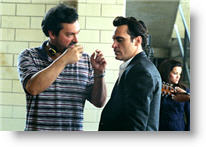
Director James Mangold and Joaquin Phoenix on the set of 20th Century Fox’s “Walk the Line”
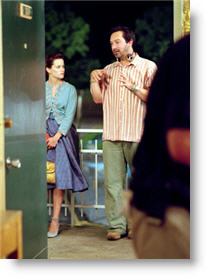
James Mangold giving instructions to nReese Witherspoon on the set
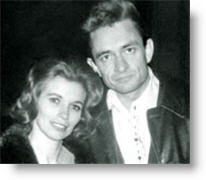
June Carter Cash and Johnny Cash
James Mangold
Director James Mangold (“Cop Land”, Girl, Interrupted, “Identity”) described the writing process and explained that he met with Johnny Cash before his passing, and also received John and June’s approval for the script. Our meeting aroused a discussion about a seemingly excessive focus on drug use in “Walk the Line”:
I wouldn’t say that drugs are the interesting aspect. I don’t think the movie gives… a lot of screen time to per se, drugs, but I think the conflict we’re interested in.
Mangold explained his reasoning for why he included certain aspects in the script:
The reality is that for America, for the world, for people—struggle with substances is a struggle to try and escape your psychological reality… Movies are about what we see and what we do. I can’t photograph things that are invisible… I could grab someone on the street and if I found a painful period of their life, I bet I could find a crutch… something that someone was losing themself in, in order to hide from something they didn’t want to confront. I don’t think there’s something unusual about drugs or alcohol with celebrities. I think what’s unusual is that celebrities are exposed to unusual levels of media scrutiny where we know every factoid about their personal lives.
Interested in learning his take on the redemption of Johnny Cash, I asked Mangold the same question I asked Phoenix, referring to what it is that ultimately saved Johnny Cash’s life. Mangold replied:
June. Simply, if arguing a fast answer, I think if June wasn’t there, I think he would have died. And I think all you have to do is look at some of the other cats in the same crew he was in to see that some of them didn’t have the “June.”
Mangold also confesses that he always felt the “engine” for this film was love—meaning the love between John and June. However, Mangold does see Johnny Cash as a kind of preacher. As we see in the film, John’s older brother, Jack, wanted to become a preacher of God’s word. Mangold describes Jack as, “…such a good boy, religious, obeying his dad, working so hard, so much more focused on his studies…”. Mangold finds an interesting contradiction in the fact that John admired his brother, Jack, who wanted to be a preacher.
In the end, Mangold gave praise to how John’s life was lived out and referred to John’s brother Jack respectfully:
…with no tarnishing of the memory of Jack Cash, I believe that John became twice—a hundred times—the preacher his older brother ever would have become. It’s not that John’s path is one that you’d recommend to somebody, but that he knew what sin was, and he knew what mistakes felt like, and he knew what it was to forgive… The part of John’s life that we’re telling the story about, is the part where he pushed God away. And, really, God started coming back to him—as did belief and love and life and living and art at the point the movie ends… A man who’s lost, taking pills and trying to destroy himself is not a man who you can just easily stick in a scene of faith—because that is his period of pushing goodness away from himself… He can’t either accept it or he doesn’t feel worthy of it, or he doesn’t believe in it.
But that journey made him, in a way, not only fulfilling his own destiny, but in a way picking up his brother’s.
See our REVIEW of “Walk the Line”
